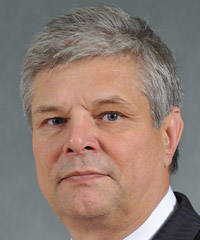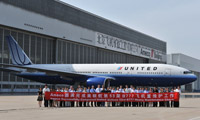Special Reports: MRO
Keeping ahead of the game
AMECO Beijing, a joint venture between Air China and Lufthansa, knows the competitive cost advantage it holds in the global MRO market as a result of China’s lower wages. It won’t last forever. The company is moving to diversify its business to keep attracting new customers.
October 1st 2013
Dr. Andreas Heizner, general manager and chief executive of AMECO Beijing, believes the ability to maintain international competitiveness is one of the main challenges facing the Chinese MRO industry. Read More »
“Cost development in China will become more and more a topic for the industry,” he said. “Our answer to this is to increase efficiency and productivity.
 |
| 'Cost development in China will become more and more a topic for the industry ' |
| Dr. Andreas Heizner Chief Executive & General Manager AMECO Beijing |
“One measure, for example, is our Lean Management initiative which helps optimize the working processes for high quality services, cost savings and shorter turnaround times.”
It is, he added, work that continues, eking out improvements across every part of the business.
The strategy has brought sustainable growth in the annual turnover of AMECO’s airframe overhaul services. Its revenue for third party international customers has increased by 20% in the airframe overhaul business in the past five years, with a sharp rise of 29% in 2010 and 55% in 2011.
In the past two years the Beijing MRO has been busy expanding its product range. It has attracted new business from airlines throughout Asia as well as North America, Europe, Russia/CIS, the Middle East and Africa.
New competencies include:
* Airframes: it has added A330 aircraft overhaul capability, inflight wi-fi installation on A330-200 and -300s and cabin upgrades on B777s.
* Components: it has constantly widened its repair capabilities on the components of B737NG/747/777s and A320/A330/A340s. This expansion will continue.
* Engines: it is increasingly offering open-loop repair for engine parts and is working towards new engine type capabilities.
* Line Maintenance: besides service enhancements in Beijing, it is looking at new locations in Mainland China. Last month it started line maintenance service in Chengdu, its seventh outstation in addition to Tianjin, Guangzhou, Shanghai, Qingdao, Chongqing and Nanjing.
* AMECO has moved into VIP completions and business jets.
“For this market segment we expect high growth rates in the future and therefore to build up a highly attractive portfolio of customer-oriented solutions,” said Heizner.
He joined Lufthansa in 1990 and held several senior positions, including three years as head of Lufthansa Technik Philippines, before taking charge at AMECO in 2011.
Heizner said the focus will be on increasing third party business, which today represents almost 80% of the revenue from aircraft overhaul. Increasing the percentage in all areas of the business is a key aim.
It has been a busy year. In April, the company delivered its 200th heavy maintenance check for United Airlines, one of its biggest overseas customers.
 |
| A United Airlines B777 undergoing maintenance at AMECO’s Beijing facility |
Under a five-year contract it has been conducting a cabin modification programme on United’s B777 fleet as well as heavy maintenance on its B747s. Since June last year it has been entrusted with United’s B747 M check for line maintenance.
In June, it completed two B737-800 C-checks for Thai budget operator and new customer, Nok Air.
It has attracted first time airframe overhaul contracts from MEGA Maldives Airlines, Business Air, Turkey’s ACT Airlines and Korea’s T’way Air. Earlier this year, it signed a deal for heavy maintenance on three B747s operated by U.S. carrier, Southern Air.
Also in June, AMECO completed a 10-month programme of cabin modifications for 10 Air China B777-200s. This involved the installation of a three-class configuration with business, premium economy and economy class, as well as installation of a PC power system, LCD video monitors and other systems.
In the past two years it has completed cabin upgrades for Air China’s A321s, A330-200s and B737-800s. In addition to cabin modification for commercial aircraft, it is promoting its capabilities to equip VIP and business jets.
It was the first Chinese MRO to gain approval to install inflight entertainment systems on Air China’s B737-800s, A321s, B777-200s and A330-300s. The system, from Singapore-based provider Flight Focus, allows passengers to use their own portable electronic devices, such as laptop computers and personal digital assistants, during flight.
It also provides internet access, mail and wi-fi chat, as well as cabin-wide HD video streaming. Installation on Air China’s A330s has started and modification on its B777s will begin in early 2014.
Heizner said AMECO must stay ahead of the game. “Asia has shown, in recent years, especially in the aviation sector, strong trends of development,” he said. “Growth of fleet and aviation [in general] will become more and more important for Asia.
“Aviation engineering also has to be developed to achieve higher standards. You can observe the trend, especially for China. I believe the aviation sector will become a strategic sector in China and, of course, companies like AMECO will be contributing to this development.”